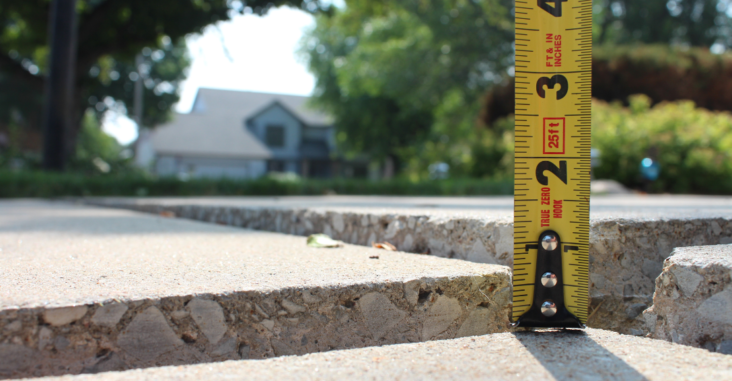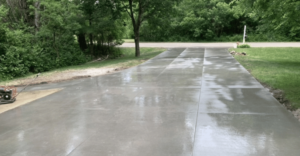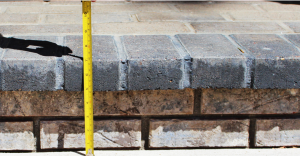Concrete Driveway Leveling

Concrete Driveway Leveling
Are you tired of driving over uneven concrete slabs on your driveway? Do you want to improve the curb appeal of your home and increase its value? Concrete driveway leveling may be just what you need.
This process involves raising and stabilizing sunken or tilted sections of your concrete surface, making it level again. Concrete driveway leveling offers numerous benefits.
It improves the safety of your driveway by preventing tripping hazards and reducing the risk of damage to vehicles. It also enhances the aesthetic appearance of your property, giving it a more polished look. Plus, a level driveway can increase resale value, making it a cost-effective investment in the long run.
In this article, we will discuss everything you need to know about concrete driveway leveling, including the steps involved in the process, how to choose the right contractor for the job, maintenance tips for a long-lasting driveway, and answers to frequently asked questions about this service.
Benefits of Concrete Driveway Leveling
Improving the evenness of your property’s main entrance not only enhances its aesthetic appeal, but also prevents potential accidents and damage to vehicles. Concrete driveway leveling is a cost-effective solution that offers durability benefits as well.
Unlike traditional methods of driveway repair such as repaving or reconstruction, leveling involves the use of specialized equipment that can correct uneven surfaces without removing or replacing existing concrete. In addition to being cost-effective, concrete driveway leveling offers other advantages over traditional repair methods.
For example, the process is quicker and less disruptive than repaving or reconstruction, which may require closing off access to your property for extended periods of time. Additionally, because it does not involve extensive excavation work, there is less chance of damaging underground utilities or structures.
Concrete driveway leveling can also improve the safety and longevity of your property’s main entrance. Uneven surfaces can be hazardous for both pedestrians and drivers alike, posing risks such as tripping hazards or vehicle damage from potholes and cracks. By correcting these issues with concrete driveway leveling, you can prevent potential accidents and prolong the lifespan of your driveway.
By understanding the benefits of concrete driveway leveling, you can make an informed decision about whether this method is right for your property. If you do decide to proceed with this type of repair, there are several steps involved in the process that must be followed carefully to ensure optimal results. These steps include evaluating the condition and extent of any damage present on your existing driveway surface before beginning work on correcting it using specialized equipment designed specifically for this purpose.
Steps Involved in the Process
Now you’re getting into the nitty-gritty of what needs to happen to make your driveway smooth as butter. It’s time to roll up your sleeves and get down to business!
The first step in concrete driveway leveling is identifying the low spots that need repair. This can be done by using a level or laser level, which will help you determine where the dips are and how deep they go.
Once you’ve identified the areas that need attention, it’s time to gather all the necessary tools needed for the job. Some of these tools may include a concrete grinder, trowel, shovel, wheelbarrow, and safety equipment such as gloves and goggles.
It’s important to have everything you need on hand before beginning the process so that you don’t have to stop midway through to go grab something from the hardware store.
Possible challenges during this process could include working with wet or cold weather conditions or encountering unexpected obstacles buried beneath the surface of your driveway. However, with proper planning and preparation beforehand, these challenges can be overcome without too much difficulty. In fact, tackling these obstacles head-on can give you a sense of accomplishment when it comes time for the finished product.
As you move forward with leveling your concrete driveway on your own or hiring a professional contractor, keep in mind that choosing the right contractor is just as important as doing an excellent job yourself. You want someone who’s experienced in this type of work and has excellent reviews from previous customers. Don’t be afraid to ask around for recommendations or do some research online before making your final decision – after all, this is an investment in both your home’s curb appeal and its overall value!
Choosing the Right Contractor
When choosing a contractor for your concrete driveway leveling project, it’s important to check for licenses and insurance. This will ensure that the contractor has met certain standards and is qualified to perform the work.
You should also read reviews and ask for references from previous clients to gauge their level of satisfaction with the contractor’s work.
Finally, compare quotes from multiple contractors to ensure you’re getting a fair price for the project.
Check for Licenses and Insurance
Before starting any project, it’s important to make sure the contractor you hire is properly licensed and insured for your own protection. License requirements vary by state, so it’s crucial to check with your local licensing board to ensure that your contractor has the proper credentials. A reputable contractor will have no problem providing you with proof of their license and insurance coverage upon request.
Not only does hiring a licensed and insured professional protect you from potential legal issues, but it also guarantees that the job will be done correctly and up to code. Insurance coverage offers additional protection in case of accidents or damages during the project, which can save you from costly repairs or lawsuits.
By taking these precautions before starting a concrete driveway leveling project, you can rest easy knowing that your investment is in good hands. Now, let’s move on to the next step: reading reviews and asking for references.

Read Reviews and Ask for References
To make an informed decision, you should read reviews and ask for references from previous clients when considering a contractor for your home improvement project. The importance of research can’t be stressed enough, as it can help you avoid hiring a subpar contractor who may cause more harm than good.
By reading reviews on websites such as Yelp or Angie’s List, you can gain insight into the level of customer satisfaction that the contractor provides. In addition, asking for references from the contractor themselves allows you to speak directly with past clients and ask any questions about their experience.
Here are five things to keep in mind when reading reviews and asking for references:
- Look for patterns in the reviews: If multiple people mention the same issue or praise the same aspect of the contractor’s work, it’s likely that this is a consistent trait.
- Check if responses were given to negative reviews: A professional response to negative feedback shows that the contractor values customer satisfaction and takes constructive criticism seriously.
- Ask references about communication: Clear communication between client and contractor is essential throughout a project. Ask past clients how well their expectations were met in terms of updates, timelines, and changes to plans.
- Inquire about unexpected costs: Many homeowners have horror stories about contractors adding extra fees at the end of a project without warning. Make sure to ask past clients if they experienced any surprise charges.
- Take note of time management: Contractors who consistently arrive late or take longer than expected to complete projects can cause major inconvenience.
By conducting thorough research via online reviews and personal references, you can increase your chances of finding a reliable concrete driveway leveling contractor who’ll provide satisfactory results. As you move forward with your search, it’s important to compare quotes from multiple contractors before making your final decision.
Compare Quotes from Multiple Contractors
Now it’s time to shop around and compare quotes from a variety of contractors. It’s like casting a wide net to catch the perfect fish for your project. Contractor pricing can vary greatly, so it’s important to get multiple quotes in order to find the best deal.
When comparing quotes, make sure you’re comparing apples to apples by looking at the same scope of work and materials being used. Once you have gathered several quotes, don’t be afraid to negotiate with the contractors. This is where having done your research on contractor pricing will come in handy. Use this knowledge as leverage when negotiating with them.
Remember that getting the lowest price isn’t always the best goal – quality workmanship should also be considered. With some negotiation tactics and careful consideration, you’ll be able to find a contractor who can offer both fair pricing and quality workmanship for your concrete driveway leveling project.
Transitioning into maintenance tips for a long-lasting driveway: Keeping up with regular maintenance is just as important as finding the right contractor for your concrete driveway leveling project.
Maintenance Tips for a Long-Lasting Driveway
Proper upkeep is key to extending the life of your driveway and preventing unnecessary repairs. One important aspect of maintenance is regular cleaning. Dirt and debris can accumulate on your driveway, which can cause damage over time if left unattended. You should sweep or hose down your driveway periodically to keep it clean.
In addition to cleaning, sealing techniques can also help preserve your concrete driveway. Sealing protects against water damage, stains, and other forms of wear and tear. To ensure maximum protection, it’s recommended that you seal your driveway every 2-3 years. Be sure to use a high-quality sealant that’s specifically designed for concrete driveways.
Finally, be mindful of any cracks or potholes that develop in your driveway. These issues can worsen over time if not addressed promptly. If you notice any damage to your driveway, contact a professional contractor as soon as possible to assess the situation and provide necessary repairs.

As you continue learning about maintaining your concrete driveway, you may have some questions about leveling techniques or other related topics. In the next section, we’ll address some frequently asked questions about concrete driveway leveling to help guide you through the process.
Frequently Asked Questions about Concrete Driveway Leveling
You may have some questions about maintaining a smooth and durable surface for your driveway, so let’s explore some frequently asked questions that can help you achieve this goal.
- What is concrete driveway leveling?
Concrete driveway leveling is the process of correcting uneven areas in your driveway by adding or removing concrete to create a level surface. This process involves using specialized equipment to inject a slurry mixture underneath the affected area, which raises it to its original position.
- Is concrete driveway leveling cost-effective?
Yes, it is! Unlike tearing up and replacing an entire concrete slab, leveling only requires fixing the affected area. Additionally, addressing uneven surfaces early on can prevent more significant problems from developing later and save you money in the long run.
- Can I perform DIY concrete driveway leveling?
While it’s possible to do it yourself with the right tools and knowledge, we recommend hiring professionals for this task. Professional contractors have years of experience and proper equipment needed to perform precise adjustments without damaging surrounding areas or making issues worse.
- How often should I level my concrete driveway?
It depends on various factors such as climate conditions, soil composition, and usage frequency. However, if you notice any signs of sinking or cracking in your driveway or observe water pooling after rainstorms, it’s best to consult with experts who can assess whether repairs are necessary.
By understanding these common inquiries about concrete driveway leveling, you’ll be better equipped to make informed decisions about maintaining your property’s exterior appearance while ensuring safety and functionality at an affordable cost-effective price point through DIY options or professional services offered by qualified contractors near you!
Frequently Asked Questions
How long does the concrete driveway leveling process take?
Looking to get a project done quickly and efficiently? You’re not alone. When it comes to home improvement, time is of the essence. That’s why you may be wondering how long the concrete driveway leveling process takes.
Well, it all depends on a few factors: the size of your driveway, the extent of damage, and whether you choose to go with professional help or take on the task yourself. While hiring a professional team will undoubtedly cost more than doing it yourself, it can save you time and ensure that everything is done correctly.
On average, expect the process to take anywhere from one day for small driveways up to five days for larger ones if you decide to hire professionals. However, if you choose to tackle this project yourself, know that it can take significantly longer as there are many steps involved in leveling a concrete driveway properly.
In either case, make sure you do your research and follow DIY tips closely for best results!
Can concrete driveway leveling be done in cold weather?
If you’re wondering if concrete driveway leveling can be done in cold weather, the answer is yes! There are actually quite a few benefits to doing it during this time.
For starters, the colder temperatures make the concrete set more slowly, which gives contractors more time to work with it and ensure that everything is level. Additionally, some techniques like slabjacking actually work better in colder weather because the ground is more stable and less likely to shift.
Of course, there are also some challenges to working in cold weather such as managing moisture levels and ensuring that the concrete doesn’t freeze before it sets properly. But with the right tools and expertise, an experienced contractor should have no problem getting your driveway leveled even when it’s chilly outside.
Will leveling my driveway prevent future cracking?
You’re tired of seeing cracks in your driveway every time you pull into your home. It’s frustrating to see something that was once smooth and beautiful become an eyesore.
But fear not, there is hope for preventing future cracking! Leveling your driveway can drastically improve its durability and longevity. By creating a flat surface, the weight of cars will be distributed evenly, reducing stress on certain areas that cause cracks to form.
Additionally, leveling allows for proper drainage, preventing water from pooling and seeping into the concrete, causing damage over time. So, invest in the future of your driveway by taking action now!
Does the type of vehicle parked on the driveway affect the need for leveling?
When it comes to your driveway, the type of vehicle you park on it can definitely affect its lifespan. Vehicle weight is a major factor in driveway damage, as heavy vehicles like trucks and SUVs can put more stress on the surface than lighter cars.
The frequency at which you level your driveway can also impact its lifespan, especially if you frequently park heavy vehicles on it. If you notice cracks or other signs of damage, it’s important to address them as soon as possible to prevent further deterioration.
Ultimately, taking care of your driveway by leveling it regularly and avoiding excessive vehicle weight will help ensure that it lasts for years to come.
Can concrete driveway leveling be done on sloped driveways?
Are you worried about the slope of your driveway and wondering if it can still be leveled with concrete? The good news is that slope compensation is possible when it comes to concrete driveway leveling. However, the process may require specialized equipment depending on the degree of incline.
Typically, a contractor will use a laser level to determine the angle of the slope and then adjust their equipment accordingly. For steeper slopes, they may need to use additional tools such as a grader or excavator to ensure proper leveling.
Don’t let a sloped driveway discourage you from getting it leveled – with the right equipment and expertise, it can be done successfully.
Concrete Driveway Leveling
In conclusion, you now know the benefits of concrete driveway leveling and the steps involved in the process. However, it’s crucial to choose the right contractor to ensure a job well done. Look for someone with experience and a good reputation in your area.
Remember, proper maintenance is key to a long-lasting driveway. Regular cleaning and sealing can prevent cracks and damage. If you ever have any questions or concerns about your driveway, don’t hesitate to reach out to your contractor for advice.
As the adage goes, “An ounce of prevention is worth a pound of cure.” By taking care of your concrete driveway now, you can save yourself time and money in the future. So, invest in quality workmanship and follow these maintenance tips to enjoy a beautiful and functional driveway for years to come.
